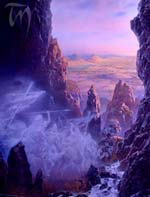



The Dúnedain: The Men of the West, those descended from the survivors
of the destruction of Númenor. The Dúnedain
of the south founded the kingdom of Gondor, while those
of the north founded Arnor. The surviving Dúnedain
of the North Line after the death of its last King
became the Rangers, who protected places like the Bree-land
and The Shire.
|
|
The Dead Men of Dunharrow: Ghosts, fated never to rest until they fulfill an oath they broke to Isildur. They fulfilled that oath in the days of Aragorn, during the War of the Ring in 3019, after which they never disturbed Middle-Earth again. Freed from the curse laid upon them by Isildur, they probably left the Circles of the World as is the fate for all of the Atani. The oath sworn by those who later became the Dead
men of Dunharrow was to aid Isildur in his fight against
Sauron. When the time came for them to fight for him,
he found that they had allied themselves with Sauron.
However, his curse so frightened them that they remained
at home, and fought on neither side of the war.
|
 |
Dwimmerlaik: The Rohirrim word for any ghosts. These included
the Lord of the Nazgûl. For so he was called
by Éowyn.
|
|
Dalemen: The Men of Dale, both before its destruction by
the dragon Smaug and after it was rebuilt. There was
one peculiarity to the Dalemen, they could understand
the speech of thrushes. It was by this method that
the weakness of Smaug was told to Bard. After the rebuilding of Dale, Bard became its first
king.
|
|
Dunlendings: The Men of Dunland. They had a long-running hatred
of the Rohirrim who had taken most of their land when
it was given by Gondor. This hatred flamed up many
times in their history. The last recorded time was
the Battle of Helm's Deep. In that battle the Dunlendings
were allied with Saruman. They had their own language
and customs. Their language sounded to most people
to be the screaming of birds and beasts.
|
|
Durin's Crown: The Dwarves name for the Plough, also called the
Sickle.
|
|
Durin's Day: The first day of the Dwarves New Year. It was on
this day that Bilbo and the dwarves in the quest of
Erebor gained entrance to the Lonely Mountain.
|
|
The Doom of the Noldor: The prophecy that was spoken by Mandos concerning the fate of those of the Noldor who followed Fëanor when he left Aman. It was also called the Prophecy of the North, and has been considered as much a curse as a prophecy. The words of the prophecy are: Tears unnumbered ye shall shed; and the Valar will
fence Valinor against you, and shut you out, so that not even the echo
of your lamentation shall pass over the moutains. On the House of Fëanor
the wrath of the Valar lieth from the West unto the uttermost East, and
upon all that will follow them it shall be laid also. Their Oath shall
drive them, and yet betray them, and ever snatch away the very treasures
that they have sworn to pursue. To evil end shall all things turn that
they begin well; and by treason of kin unto kin and the fear of treason,
shall this come to pass. The Disposessed shall they be forever. This doom affected even those who, like Galadriel, had no intention
of participating in Fëanor's vengeance.
|
|
| Books Used in this Document: |
|
| Back To The Top | |
| This page was last modified on . |

